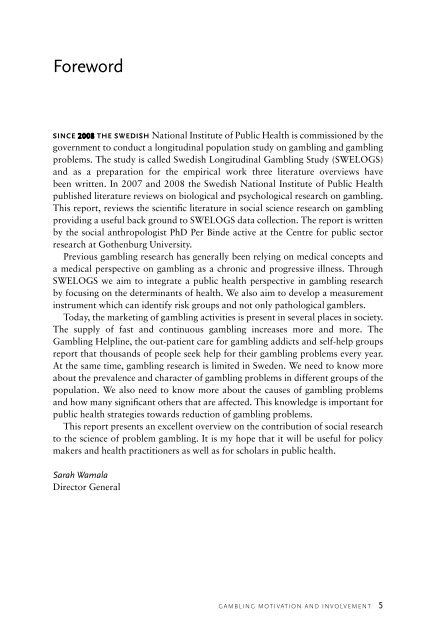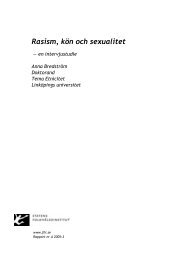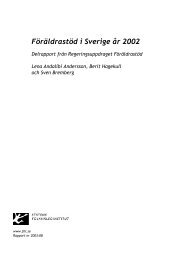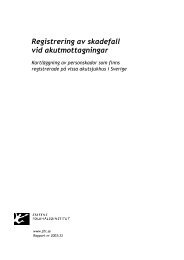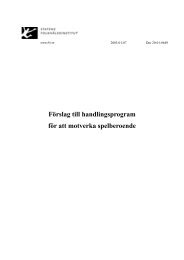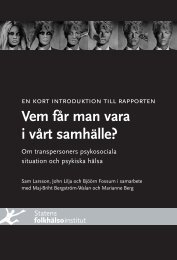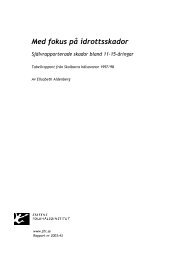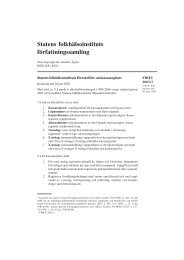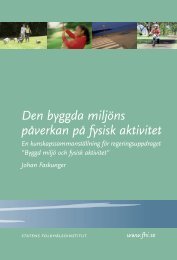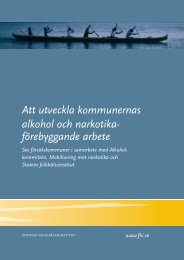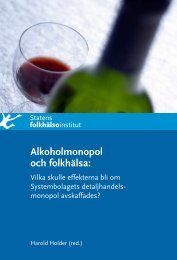Gambling motivation and involvement: A review of social
Gambling motivation and involvement: A review of social
Gambling motivation and involvement: A review of social
You also want an ePaper? Increase the reach of your titles
YUMPU automatically turns print PDFs into web optimized ePapers that Google loves.
Foreword<br />
SincE 2008 thE SWEdiSh National Institute <strong>of</strong> Public Health is commissioned by the<br />
government to conduct a longitudinal population study on gambling <strong>and</strong> gambling<br />
problems. The study is called Swedish Longitudinal <strong>Gambling</strong> Study (SWELOGS)<br />
<strong>and</strong> as a preparation for the empirical work three literature overviews have<br />
been written. In 2007 <strong>and</strong> 2008 the Swedish National Institute <strong>of</strong> Public Health<br />
published literature <strong>review</strong>s on biological <strong>and</strong> psychological research on gambling.<br />
This report, <strong>review</strong>s the scientific literature in <strong>social</strong> science research on gambling<br />
providing a useful back ground to SWELOGS data collection. The report is written<br />
by the <strong>social</strong> anthropologist PhD Per Binde active at the Centre for public sector<br />
research at Gothenburg University.<br />
Previous gambling research has generally been relying on medical concepts <strong>and</strong><br />
a medical perspective on gambling as a chronic <strong>and</strong> progressive illness. Through<br />
SWELOGS we aim to integrate a public health perspective in gambling research<br />
by focusing on the determinants <strong>of</strong> health. We also aim to develop a measurement<br />
instrument which can identify risk groups <strong>and</strong> not only pathological gamblers.<br />
Today, the marketing <strong>of</strong> gambling activities is present in several places in society.<br />
The supply <strong>of</strong> fast <strong>and</strong> continuous gambling increases more <strong>and</strong> more. The<br />
<strong>Gambling</strong> Helpline, the out-patient care for gambling addicts <strong>and</strong> self-help groups<br />
report that thous<strong>and</strong>s <strong>of</strong> people seek help for their gambling problems every year.<br />
At the same time, gambling research is limited in Sweden. We need to know more<br />
about the prevalence <strong>and</strong> character <strong>of</strong> gambling problems in different groups <strong>of</strong> the<br />
population. We also need to know more about the causes <strong>of</strong> gambling problems<br />
<strong>and</strong> how many significant others that are affected. This knowledge is important for<br />
public health strategies towards reduction <strong>of</strong> gambling problems.<br />
This report presents an excellent overview on the contribution <strong>of</strong> <strong>social</strong> research<br />
to the science <strong>of</strong> problem gambling. It is my hope that it will be useful for policy<br />
makers <strong>and</strong> health practitioners as well as for scholars in public health.<br />
Sarah Wamala<br />
Director General<br />
G A M B L I N G M O T I VAT I O N A N D I N V O LV E M E N T 5


